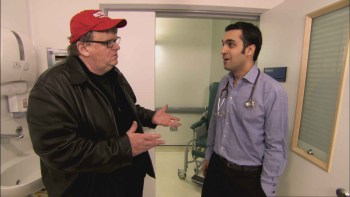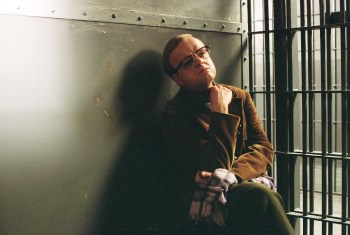Sicko
 As a member of the choir, I ran screaming from the church because of Michael Moore’s preaching in Sicko.
As a member of the choir, I ran screaming from the church because of Michael Moore’s preaching in Sicko.
I’m in the minority here – the movie got good reviews and an Oscar nomination in the documentary category – but this was among the least effective films I saw all year. (Full disclosure: I have had some issues with Moore.)
The big guy starts this movie by pointing out that George W. Bush doesn’t speak well – oooooh, brave – and follows that with two anecdotes that his voice-over admits are not directly related to his thesis. Then why the fuck are they there, and why the fuck did you start the fucking movie with them, asshole? I can live with digression, but when you digress before you’ve even gotten going, we’re going to have trouble.
The thesis is, as far as I can tell, that Americans should really have the “free” health care that everybody else in the world apparently does, even Cuba. The word “free” is used, without qualification, dozens of times, often by Moore himself.
But it’s not free, anywhere, and it never has been and it never will be. How many times does Moore talk about the cost of universal health care, or even allude to it?
Twice.
Moore nearly ignores this essential component of the health-care debate as if it were a minor detail, and he doesn’t dare go near the third rail of logistics – private versus public approaches, universal or gap coverage, rationing, etc.
How does he reconcile his hatred of corporate America and his belief in the corruption of public officials in the United States with his implication that universal health care is easy? He treats health care like some self-replenishing fairy dust that just needs to be collected by magic, benevolent elves and delivered cheerfully by Santa or the Easter Bunny or Hillary Clinton before the mean ol’ insurance companies got hold of her.
His discussion of this genuinely important issue is facile and wrongheaded to the extent that I wondered if he had recently suffered a traumatic brain injury, or if he simply thinks his audience is so stupid that it will (a) not recognize the screaming omissions or (b) not care.
Moore is obviously a proud agitator, and he certainly agitated me. But I support universal health coverage, and at the end of the day I think a single-payer system makes the most sense – and I believe it would be worth the considerable cost and bureaucratic bungling. Why does he want to piss me off – and piss me off about him, rather than about the millions of Americans without access to affordable health care?
Infamous
 Backlash is always fascinating to watch, and after Capote earned a Best Picture Oscar nomination, many people turned on it and found a convenient outlet: Douglas McGrath’s Infamous, which is almost identical in scope in depicting Truman Capote’s research for and writing of In Cold Blood.
Backlash is always fascinating to watch, and after Capote earned a Best Picture Oscar nomination, many people turned on it and found a convenient outlet: Douglas McGrath’s Infamous, which is almost identical in scope in depicting Truman Capote’s research for and writing of In Cold Blood.
I can find no reason why anybody would prefer Infamous to Capote, so I’ll continue to believe that one champions McGrath’s movie merely to spite Bennett Miller’s. There isn’t a single credible scene in Infamous, and as a result its conceit – that Capote and murderer Perry Smith fell in love – is downright comical.
That hook would be theoretically workable, I guess, if Capote weren’t the object of his own obsession; Truman in both movies is capable of loving only one person: himself. That’s a key theme in Capote, but McGrath doesn’t see the disconnect between it and his death-row romance in Infamous. If the narrative had more psychological nuance – if the relationship between Capote and Smith didn’t lead to a climactic kiss, for example – it might have been more believable.
It doesn’t help that McGrath’s storytelling skills are crude throughout. His script employs a bizarre, superfluous, and disorienting “interview” motif – in which Capote’s contemporaries talk about him – that’s symptomatic of a larger lack of rigor. The story is straightforward and linear, but it still manages to meander until the moment that Smith and Capote lock eyes for the first time. From that point forward, I yearned for a return to the meandering, rightly afraid of where things were headed.
As a director, McGrath is best judged by the uniform awfulness of the acting. A great number of familiar and usually reliable performers – Sigourney Weaver, Hope Davis, Gwyneth Paltrow, Isabella Rossellini, Daniel Craig, Jeff Daniels, and Sandra Bullock – look foolish. Everybody is too pitched and forced, like they’re playing to the back row.
And pity poor Toby Jones in the lead. I can’t begin to describe what goes wrong with his Truman Capote, but you can nearly see the flop sweat he’s trying so hard. The audience not only doesn’t get any real sense of the character; we don’t even get a good sense of his mask. The actor is the only thing visible.
One critical difference between the two movies is that Miller’s film takes the time to pause, and we have an opportunity to see a solitary Truman, and Philip Seymour Hoffman quietly breathes life into the author. Jones never gives the flouncy mannerisms a rest, and it’s amateurish at best. Lucky for him, McGrath’s performance at the helm is even worse.
(An honest plea: If you liked Infamous better than Capote, please explain why in the comments. I want to understand.)

